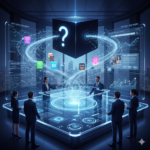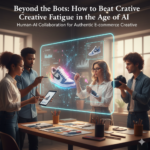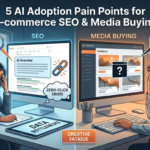AI, or Artificial Intelligence, has been lurking in the back of our minds for decades as a possible downfall of the human race at large. Less bleakly, it also has been full of exciting possibilities for those of us who fantasized about living in a Back to the Future II-esque “smart world” and what that would actually end up looking like.
Now, we’re at a crossroads. With the implementation of AI models accelerating rapidly and catching steam with ChatGPT’s beta launch, the tides of change are getting stronger.
As with any new technology or innovation, it’s caused a change in standard working practices. Many have voiced concerns about how AI will disrupt the job market, making certain occupations redundant. And with the large-scale layoffs across the tech sector starting last year still fresh in our minds, fears around this have not yet been quelled as we see the trend of more unemployment and fewer open jobs than in decades continue.
Could this new technology pose an existential threat to humanity?

In this article:
The Worry: What About Our Livelihoods?
The rise of AI following the release of ChatPGT in 2022 has been drastic, to say the least.
When it comes to the way we work, live, and educate ourselves and others, AI is not the first technology to reshape our approach or disrupt economies. Even within the realm of artificial intelligence, generative AI is not the first application to bring about such transformations. Factory workers have long been acquainted with the looming threat of job displacement by robots. Today, it’s generative AI that is making waves in economies on a global scale, particularly when it comes to automating easy-for-AI composition tasks.
“History suggests profound technological change presents significant challenges for policymakers. Each of the three previous industrial revolutions had a similar initial impact: it hollowed out jobs across the economy, it led to an increase in inequality and to a decline in the share of income going to labour.”
– The Guardian
Economists and analysts fear massive job losses and widening inequality as societies transition. Malvina Vega, Content Writer for TechJury, did some deep diving into research to suss out a lot of statistics when it comes to the numbers associated with this complex topic, and Goldman Sachs agrees. Some gathered stats and predictions she included:
- By the mid-2030s, up to 30% of today’s jobs could be automatable.
- There’s a risk of losing 85 million by 2025 worldwide, and as many as 375 million jobs by 2030. The number of jobs lost to automation by 2030:
- Germany: 17 million automated
- USA: 73 million jobs automated
- China: 236 million jobs automated
BACK TO TOP
How It’s Affecting Jobs Presently
It’s not that we’re doomsayers, but we’d be remiss to ignore the facts. As someone who was personally laid off in Q3 of 2022 by a health tech company, I subsequently watched my previous employer’s marketing language shift from offering “one-on-one support from professional coaches” to “utilizing machine learning” for personalized experiences as the hook to help folks improve their well-being and establish healthy habits.
What we are seeing now and can expect more of lies below.
Hiring Freezes
Jobs that aren’t even filled are being cut preemptively. For example, IBM’s CEO Arvind Krishna plans to pause hiring for roles that could be replaced with AI, focusing on the next 5 years. The jobs would be non-customer-facing roles in departments like HR, removing the need for roughly 26,000 employees.
The news comes amidst a long flurry of layoffs in the tech sector, and a dearth of Help Wanted ads more broadly. The latest federal numbers show the number of open jobs in the United States has dropped to its lowest level in two years.
Job Automation
In the best case, AI will cause massive disruption to job markets. But if policy makers think that they have time to come up with a suitable response, not only do they lack foresight, but they have their eyes wide shut to the present.
“People keep saying AI is coming but it is already here.”
– Mihir Shukla, Tech Entrepreneur, World Economic Forum 2023
Unemployment Surges
Year-to-date, 2023 hiring has reached its lowest since 2016. To top it all off, this is reported to be the worst five-month start to a year, seeing the most layoffs since 2020 when the pandemic wiped out a whopping 1.4 million jobs globally in the same window.
A significant number of 4,000, small only in the grand scheme of things, are said to have lost their employment in May this year because of AI, or 5% of the total jobs. This makes it the seventh-highest contributor to employment losses last month cited by employers. This is significant, given that this is AI’s debut in being cited as a cause on the Challenger Report.
While these numbers aren’t solely due to the implementation of automation, some sectors are already seeing the effect of AI while others are doing what they can to brace for impact.
Finding a Way: Human Resilience
Although AI is the working man’s current boogeyman, it’s not even close to the first time the rapidly advancing technology has made headlines for replacing humans. Agriculture, manufacturing, freight, and logistics are all examples of jobs that used to be run by people that are now taken care of in large part by machines.
We’ve bounced back before, we can do it again. What that looks like, however, is undefined and requires a willingness to learn new skills (not to mention the time and money, a problem for many non-white collar workers), lean into more practical jobs, and unwavering endurance, perseverance, and most of all, resilience.
Some folks have dived into gig work or general labor, like walking dogs and fixing AC units. Now more than ever, more college-educated bodies can be found plumbing away in your kitchen or delivering your grocery order to your door. These types of employment have been called “non-skilled work” for decades. Now can we finally admit they have always been grandly mislabeled?
BACK TO TOP
Much Ado About Nothing?
According to this ChatGPT generated, human-edited article on how AI will affect jobs from January, the sentiment of the future outlook is mostly positive. It highlights the potential benefits of AI chat technology, such as creating new roles and jobs, improving communication efficiency, assisting individuals with tasks, and opening up opportunities for creativity.
However, it also acknowledges that AI technology can automate jobs and have a short-term negative impact on employment. Overall, the text encourages awareness, preparedness, and investment in education and training to support individuals in adapting to the changes. The ChatGPT-generated highlights on AI technology from the articles:
- New roles are foreseen in both technical and creative fields.
- More efficient communication and information sharing.
- Assistance with tasks like data analysis and troubleshooting, benefiting individuals who may not be technically inclined.
- More flexible and accessible communication options for individuals with dyslexia.
- Opportunities for new technical QA roles for testing and implementing AI-generated solutions.
- AI chat technology can generate new content, opening up opportunities for individuals to create scripts or stories.
- The long-term impact of AI chat technology on employment is likely to be positive, driving innovation, growth, productivity, and efficiency.
- Preparation is key for the changes brought by AI technology by establishing policies and measures to support the transition to an automated future.
- Investing in education and training programs is essential to equip individuals with the necessary skills for new roles and jobs created by AI technology.
But as it was written by the culprit itself, can it really be trusted? 🤔
Is the Silver Lining Bright Enough?
Going back to more of Vega’s stats unearthed in research, there seems to be some hope on the horizon… if we can just make it there.
- AI is projected to create 58 million new jobs by 2022.
- Specific to the UK, AI will create as many jobs as it displaces over the next 20 years.
- By 2022, the total task hours completed by humans dropped significantly from 2017. This trend is still going. (Good news for workers, IF employers don’t steal that time back for themselves as they tend to do.)
- Healthcare is an industry where AI can do a lot of heavy lifting, which is good news for the ginormous Boomer generation entering later life stages. Especially since it has long been historically an understaffed and high-burnout industry.
While there are many ways that AI can improve life, it’s the in-between times that we’ve already started wading into that leaves many worried about their footing.
(Will) New Jobs Emerge(?)
A dramatic rise in the prevalence of generative AI combined with corporate belt-tightening during economic uncertainty means humans on the cheap with AI. The big question is whether this trend will last (or for how long), or spawn a new wave of jobs that pays the soulful animate well to work in tandem with smart droid counterparts.
According to proponents of AI, if utilized effectively, this technology has the potential to usher in an era of abundance. They envision a future where automated systems take care of our basic needs, freeing up valuable time for altruistic endeavors and leisurely pursuits. By embracing AI’s capabilities, they foresee a world where humanity can thrive, dedicating their energies towards acts of kindness and enjoying the fruits of leisure.
While that is an attractive future, could it really come to pass (and if it does, will marginalized groups of the most needy also benefit)? Like a phoenix from the ashes, can employment opportunities resurrect and live again? Let’s see what human experts have to say.
Analysts and historians with insight into the uprising of previous technology that has replaced human workers, generative AI can, and already is, creating new jobs. The expectation (hope?) is that this very young technology will continue to snowball in job-generating, allowing humans and robots to evolve together.
AI Can Enhance Your Job Performance
On LinkedIn, it’s no shock that the AI discussion has been on the rise since late last year. Some claimed that AI won’t steal your job like here in December ‘22. (Now that we’re 6 months in, we’ve seen that this isn’t necessarily true–but we must concede that it’s not all bad news.)
Frank Lazaro, an experienced marketing strategist, says that artificial intelligence shouldn’t be viewed as a job thief lurking in the shadows. Instead, Lazaro states AI can be likened to a tool, and those who wield it skillfully hold the key to success and will be the ones taking over many roles. Essentially, he says that learning AI and getting comfortable with it is akin to sharpening your sword to give you the edge you need by improving efficiency, decision making, innovation, and communication.
BACK TO TOP
Today: How People are Making AI Work Them
ChatGPT, PhotoShop, AI assistants and more can be harnessed to help individuals in their company and small businesses. The ones who learn how are able to spend less time on menial, repetitive or complex tasks and focus more on quality of production, customer service, and best of all, their lives outside of work. By exploring AI tools or AI features newly plugged into existing platforms, keeping up with some of the knowledge and how to use these components gives a leg up over competitors who fail to recalibrate or evolve with the times.
Check out some of these helpful insights shared by professionals on how they are making iRobot do their iDirty work for them:
Photoshop AI
Here, graphic and web designer Kaylie Halbrook of Paideia Graphics has discovered perfect ways to use Adobe’s new AI feature for Photoshop. Called “Generative Fill,” this photo manipulation innovation allows users to make fast and realistic edits that would have previously taken hours. Noting that this feature has great potential as it simplifies the process of showcasing designs using mockup tools, Halbrook expands on how it enables users to place designs in realistic, 3D settings quickly, modify stock photos to meet specific needs, or fix minor issues in promotional photos effortlessly. This graphic designer has implemented this AI feature to save impressive amounts of time to open up possibilities for enhanced design workflows.
AI Assistants
Elijah Elkins, HR SaaS startup executive, talks about Comeet‘s AI ability to assist in the more boring parts of the job that are necessary, yet time-consuming. This AI Assistant can help you get mundane yet important tasks out of the way quickly so that leaders can focus on building up their ideal workforce.
ChatGPT
Zain Kahn, dubbed “The AI Guy,” shares the many ways how folks can harness the many possibilities that ChatGPT offers for personal learning, improve your writing skills, summarize long documents, chip away at writer’s block, and more.
For further learning and discovery of use for ChatGPT & AI, I recommend going over to LinkedIn and using the search feature to discover even more ways professionals are utilizing these new technologies!
BACK TO TOP
Pack Predictions
There’s no denying that the job market will, and is, suffering. Ironically, COVID forced the hands of many to invest in smart solutions when lockdown and social distancing was raging, making it impossible for human workers to fulfill their jobs. Coming off the back of the pandemic and the comorbidity of the Great Layoffs of ‘22-’23, the timing isn’t the best for the boom of AI for the wellbeing of the economy today.
But is that AI’s fault, or the greed of corporate personalities who are focused on making their investors happy at the expense of their countries and fellow citizens, or even somewhere else?
No matter the cause, what we need to focus on is the reality of the current state of affairs and learn from the past, listen to the wisdom of the experts, and take action to evoke the best possible trajectory that gets us through to the coming times as unscathed as possible.
The truth is, the future is now, and short of a global nuclear fallout destroying life as we know it there’s no going back to “before.” We need to both embrace and establish policies surrounding AI, and quickly.
We’ve already unlocked the potential that lies within the realm of AI. Now, it’s up to us to own the great responsibility that comes with that great power.
Where globalization means, as it so often does, that the rich and powerful now have new means to further enrich and empower themselves at the cost of the poorer and weaker, we have a responsibility to protest in the name of universal freedom.
– Nelson Mandela






